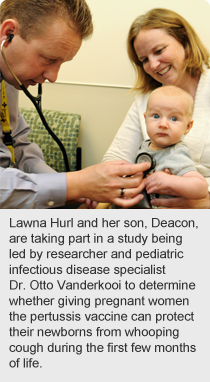
September 20, 2013
Story by Greg Harris, photo by Paul Rotzinger
CALGARY — Lawna Hurl says she “signed up on the spot” several months ago when a researcher approached her at a maternity clinic here about participating in a study related to the pertussis vaccine.
 Hurl, who gave birth to her son Deacon on July 1, is one of several moms in both Calgary and Edmonton who are helping researchers determine whether giving pregnant women the pertussis vaccine will protect their newborns for the first few months of life.
Hurl, who gave birth to her son Deacon on July 1, is one of several moms in both Calgary and Edmonton who are helping researchers determine whether giving pregnant women the pertussis vaccine will protect their newborns for the first few months of life.
Newborns are particularly vulnerable to the potentially fatal respiratory infection — more commonly known as whooping cough — until at least partial immunity develops following immunization at two months of age.
“I know that pertussis is something the really little ones can get and so I thought it was worth helping out with this,” says Hurl. “If this can lead to an improvement in public health, then I just think it’s really important to assist in any way I can.”
Dr. Otto Vanderkooi, a pediatric infectious disease specialist and researcher with the University of Calgary and Alberta Children’s Hospital Research Institute, says there are between one to three deaths in Canada each year due to pertussis, all of them in children too young to have begun their immunization.
“If the research shows that pregnant mothers who receive the pertussis vaccine pass on enough antibodies to their babies to provide protection, then it could be an effective strategy to eliminate or lessen the severity of the illness in the youngest and most vulnerable age group,” says Dr. Vanderkooi.
Even when it’s not fatal, whooping cough can still have serious consequences for the very young. Children can cough so hard they vomit. Other serious complications in young children can include pneumonia and seizures.
Whooping cough starts as a mild cold but can rapidly progress to a severe cough with a gasping intake of breath that can sound like a whoop. Very young children may develop significant distress and require hospitalization. Recovery can take months.
“Most people think of whooping cough as a disease of the past, but we still have many cases of pertussis in Canada each year,” says Dr. Wendy Vaudry, a pediatric infectious disease specialist and researcher with the University of Alberta and Stollery Children’s Hospital in Edmonton.
Although widespread vaccination has helped to limit the spread of pertussis, outbreaks still occur. There were 333 cases of pertussis in Alberta in 2012. Since 2011, two infants too young to have been immunized have died. Last year in Edmonton, 17 children were admitted to hospital, with many needing extended stays to recover.
Pertussis immunization in the province is part of the DTaP (Diphtheria, Tetanus, acellular Pertussis) vaccine and is recommended at two, four, six and 18 months of age; again at four to six years of age; and again in Grade 9.
Researchers in both cities are hoping to enrol more pregnant moms in the national study. To be eligible, the pregnancy must be considered low-risk. Study participants will randomly receive either the pertussis vaccine or a standard tetanus-diphtheria booster. Researchers will take samples of cord blood, the infant’s blood, the mother’s blood and breast milk, and will stay in touch during scheduled study visits and by phone until the baby is 18 months old.
Expectant moms interested in participating in the Calgary arm of the study are asked to phone the research coordinator at 403-955-2981. Those in Edmonton can call 780-735-6641.
- 30 -